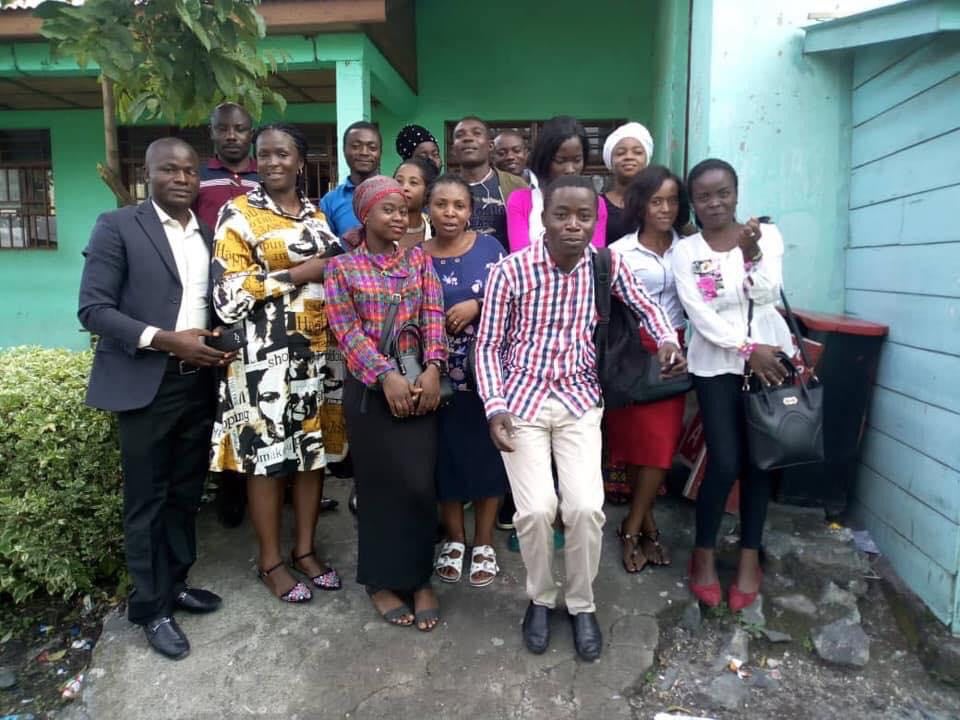
SELF-HELP AND RESILIENCE IN THE DEMOCRATIC REPUBLIC OF CONGO
I interviewed Bertin Kalimbiro from the Democratic Republic of Congo about his work in the Goma region to grow food safely and help people threatened
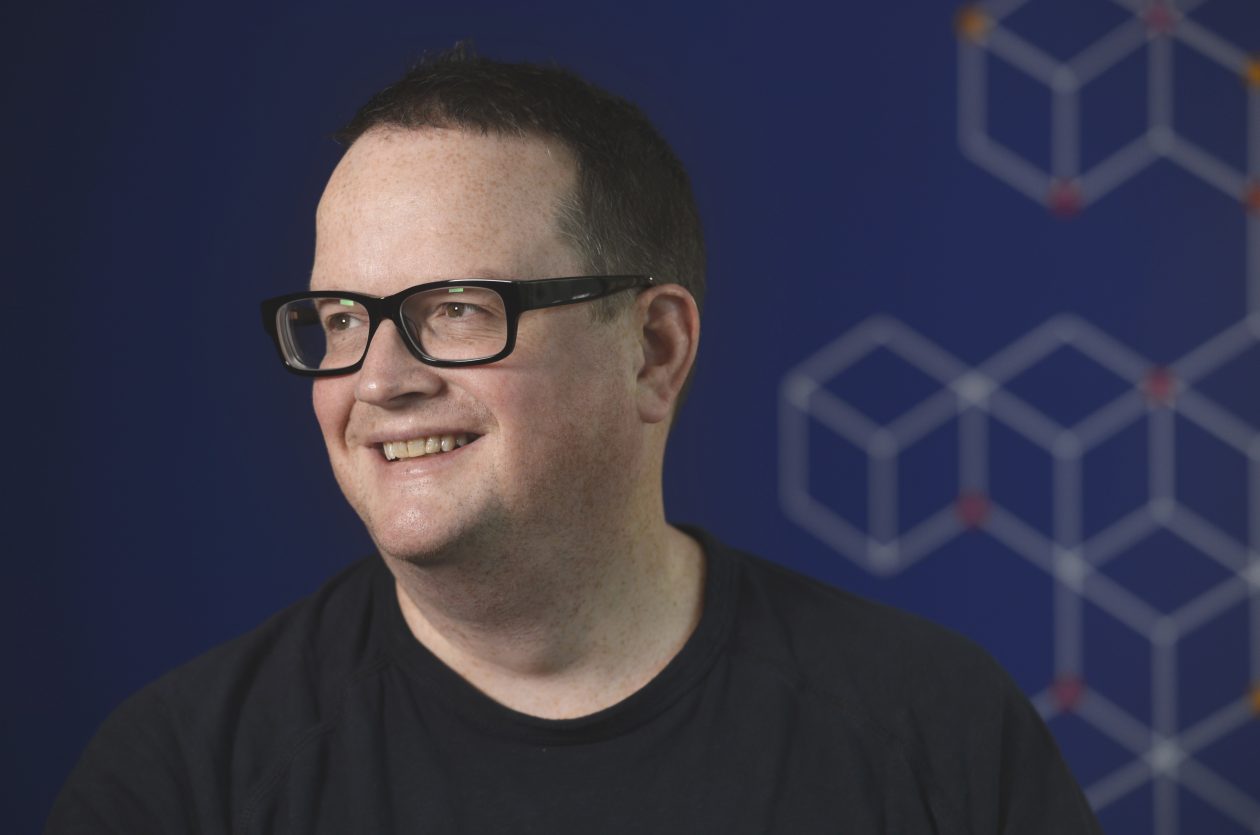
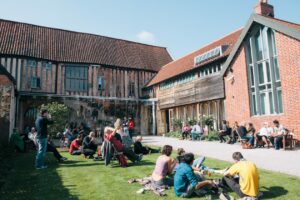
I asked Chris Gribble, the Chief Executive of the National Centre for Writing in Norwich, about his wide-ranging work promoting the arts. Chris is chair of ICORN (the International Cities of Refuge Network), and sits on the Boards of Carcanet Press and Modern Poetry in Translation and the New Anglia LEP Culture Board. He is a Fellow of the RSA.
Leslie: Could you tell us about your job as an arts administrator at the National Centre for Writing?
Chris: It’s a wide-ranging job and never dull, which is something I’m deeply pleased about. On a day-to-day basis I’m CEO of a company and charity with 17 permanent staff at 12 more sessional staff and we have a turnover over £1m. The important thing – as far as I’m concerned – is that the company exists only to achieve our key aims of
• exploring the art of literature (creative writing, reading and literary translation)
• using literature in formal and informal learning settings to empower and fulfil individuals and communities
• to celebrate Norwich as a centre of national and international excellence in literature, ensuring that everyone who lives here, works here or visits here is able to engage in literary activity.
Everything is geared to those things, so while leadership, strategy development, fundraising, partnership development and keeping the plates spinning happen every day, it’s the art and the programmes and the people and communities we work with that take centre stage.
Leslie: Could you add a few anecdotes that illustrate your day-to-day activities, please?
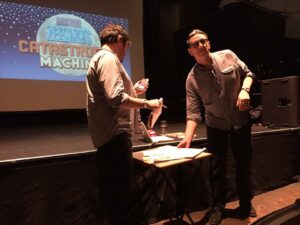 Chris: My job here has encompassed everything from leading the bid for Norwich to become England’s first UNESCO City of Literature to singing My Old Man Said Follow The Van with ex-Prime Minister John Major on an open air stage in front of 300 people: it has taken me from following a wonderful Chinese novelist into a pigeon shed outside a tiny library near King’s Lynn to sharing a stage (very briefly) with two Nobel laureates in Beijing; I have picked slugs off the windows of Dragon Hall at midnight after clearing up a wedding party and talked to some of the world’s best writers at events for hundreds – both things within days of each other – so it’s not a dull job…
Chris: My job here has encompassed everything from leading the bid for Norwich to become England’s first UNESCO City of Literature to singing My Old Man Said Follow The Van with ex-Prime Minister John Major on an open air stage in front of 300 people: it has taken me from following a wonderful Chinese novelist into a pigeon shed outside a tiny library near King’s Lynn to sharing a stage (very briefly) with two Nobel laureates in Beijing; I have picked slugs off the windows of Dragon Hall at midnight after clearing up a wedding party and talked to some of the world’s best writers at events for hundreds – both things within days of each other – so it’s not a dull job…
Leslie: As chair of The International Cities of Refuge Network, can you describe what the organisation does and what you’ve learned/experienced through carrying out this role.
Chris: ICORN is an independent organisation of cities and regions offering shelter to writers and artists at risk, advancing freedom of expression, defending democratic values and promoting international solidarity.
Writers and artists are especially vulnerable to censorship, harassment, imprisonment and even death, because of what they do. They represent the liberating gift of the human imagination and give voice to thoughts, ideas, debate and critique, disseminated to a wide audience. They also tend to be the first to speak out and resist when free speech is threatened.
ICORN member cities offer long term, but temporary, shelter to those at risk as a direct consequence of their creative activities. Our aim is to be able to host as many persecuted writers and artists as possible in ICORN cities and together with our sister networks and organisations, to form a dynamic and sustainable global network for freedom of expression.
As Chair I lead a Board of 8 people with a secretariat of 5 staff (based in Stavanger, Norway) who connect this network of nearly 70 cities and support the process from the point of writers and artists applying to join the network to developing a strategy for their lives after their residency has finished.
It’s a source of great pride that I’m able to support the ICORN mission in this small way and in the current global environment the work feels more necessary than ever.
Leslie: What’s the story behind your name, as given in your Twitter handle @NWCChris, and your full name Lenzin-Mānod Gribble?
Chris: For the last couple of years I’ve replaced my first name with the name of the current month of the year in a range of languages – Middle English, Old High German – out of sheer curiosity and enjoyment at marking the months pass and recalling the depth of meaning we cram into the names of our months. (In Old English, for example, March is called Hrēþ-mōnaþ ‘Month of the Goddess Hrēþ’ or ‘Month of Wildness’ which I love – as it is a wild month in terms of weather!)
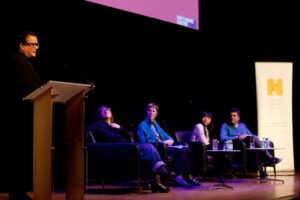 Leslie: What’s the range and the most important activities you’re involved at Carcanet Press?
Leslie: What’s the range and the most important activities you’re involved at Carcanet Press?
Chris: As a Board Member of Carcanet Press I have a series of governance duties outlined by Companies House that range from ensuring we trade in a solvent fashion to contributing to the company’s strategic direction. In reality it’s a non-executive role that sees me attend board meetings and offer support across all the professional and artistic challenges that small publishers face. Whether it’s making suggestions for new office space to offering advice on databases or venues for events and parties depends on what comes up during the year!
Leslie: How you try to ensure fairness, diversity, relevance, excellence and originality in all the arts you’re involved in?
Chris: This is an interesting question and you outline five things that are connected but distinct so it’s a tough one to answer! Each of the terms you use in the question can be interpreted in many ways. We commission work, co-commission work, programme and curate events and festivals, develop artists, run courses, engage schools and young people in our work and develop programmes regionally, nationally and internationally – across all of these things we strive to ensure that a diversity of voices and stories are told and heard; that different audiences and communities are able to find things in our programmes; that we address the world that we and our audiences inhabit to try and shed light on it and to ensure at all times that we’re making and supporting work and writers and artists that pursue quality in their practice. We absolutely don’t succeed in every area all the time – it would be weird and unlikely were we to do so – but we do try and we have a range of strategies and tactics that we use to increase our chances of success. We ask ourselves about quality all the time, we check whether we’re both reflecting the world our audiences inhabit as well as challenging it, we assess regularly the nature and range of voices we work with, curate and showcase and we try to do better all the time.
Leslie: Who do you admire – why them?

Chris: So many people! Ali Smith is a writer and person I admire – for the ways she cares about, tends, exercises and makes new our language, because of the stories she tells and her care in doing so.
In my own field I admire Claire Malcolm (New Writing North) and Steve Dearden (Writing Squad) for their commitment, ingenuity and belief in the power of the art form we all care about and for making their jobs, companies and achievements with their own hands.
I am in awe of Masha Gessen, the Russian-American writer and journalist who holds Putin and Russia (as well as the West) up to scrutiny and Elif Shafak, a Turkish writer who campaigns and writes with equal passion and commitment.
Leslie: Given that forced exile and globalisation is widespread, what can artists and writers do to stay in touch with specific community experience?
Chris: All good art is specific. One can be in exile within one’s own community.
I was reminded recently of the Norwich polymath Thomas Browne (1605-1682). He is recorded as being the originator of nearly 800 new words in English by the Oxford English Dictionary. One of those words was ‘migrant’. It means, at root, to move from one place to another. We all do that in some form or other. We are all migrants. We can choose whether to recognise that commonality or deny it. I know which I choose.
Next week feminist researcher Rachel Thain-Gray talks about Glasgow Women’s Library, a collection of iconic publications and objects testifying to the importance of women in history.
ABOUT LESLIE TATE’S BOOKS:

I interviewed Bertin Kalimbiro from the Democratic Republic of Congo about his work in the Goma region to grow food safely and help people threatened

I interviewed computer expert and sustainability campaigner Dr Erlijn van Genuchten, who writes easy-to-understand books based on science full of practical suggestions for planet-friendly living.

I interviewed Canadian cartoonist Dawn Mockler about how she works on cartoons that might be environmental or wordless but always witty – especially her famous
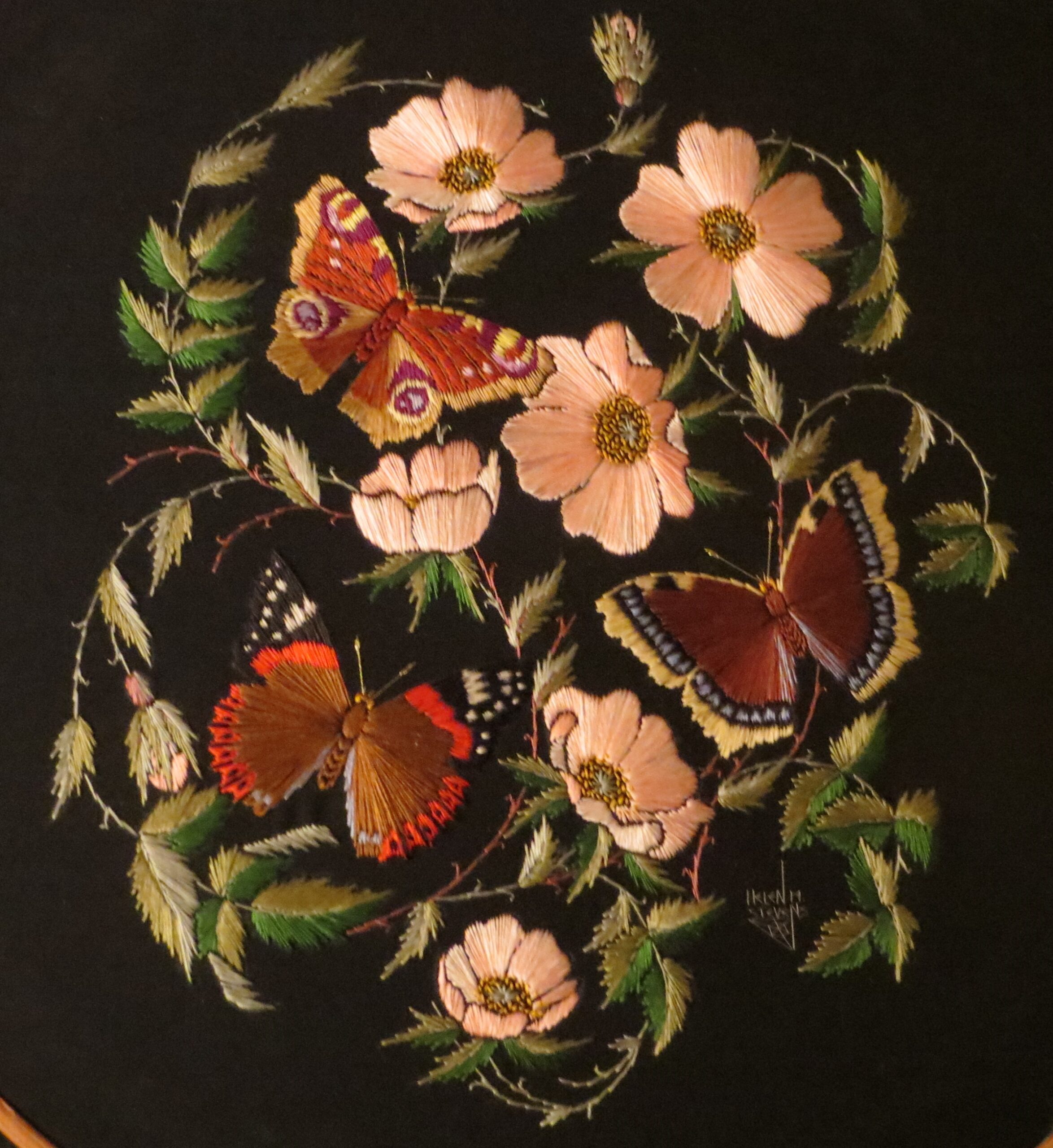
I inteviewed Helen M Stevens about how she has revived the art of embroidery, creating original contemporary patterns while studying and drawing on, “One of
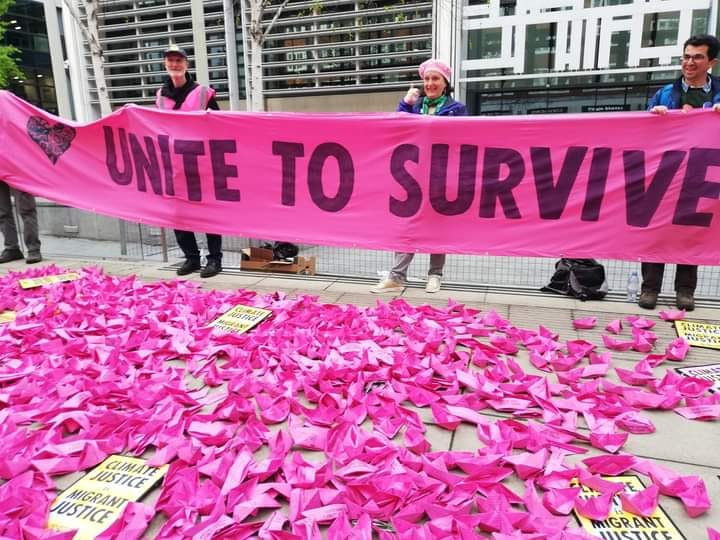
I interviewed Councillor Rachel Smith-Lyte about the origins of her passion for nature and her environmental activism. Rachel tells the story of her teaching (and
| Cookie | Duration | Description |
|---|---|---|
| cookielawinfo-checkbox-analytics | 11 months | This cookie is set by GDPR Cookie Consent plugin. The cookie is used to store the user consent for the cookies in the category "Analytics". |
| cookielawinfo-checkbox-functional | 11 months | The cookie is set by GDPR cookie consent to record the user consent for the cookies in the category "Functional". |
| cookielawinfo-checkbox-necessary | 11 months | This cookie is set by GDPR Cookie Consent plugin. The cookies is used to store the user consent for the cookies in the category "Necessary". |
| cookielawinfo-checkbox-others | 11 months | This cookie is set by GDPR Cookie Consent plugin. The cookie is used to store the user consent for the cookies in the category "Other. |
| cookielawinfo-checkbox-performance | 11 months | This cookie is set by GDPR Cookie Consent plugin. The cookie is used to store the user consent for the cookies in the category "Performance". |
| viewed_cookie_policy | 11 months | The cookie is set by the GDPR Cookie Consent plugin and is used to store whether or not user has consented to the use of cookies. It does not store any personal data. |